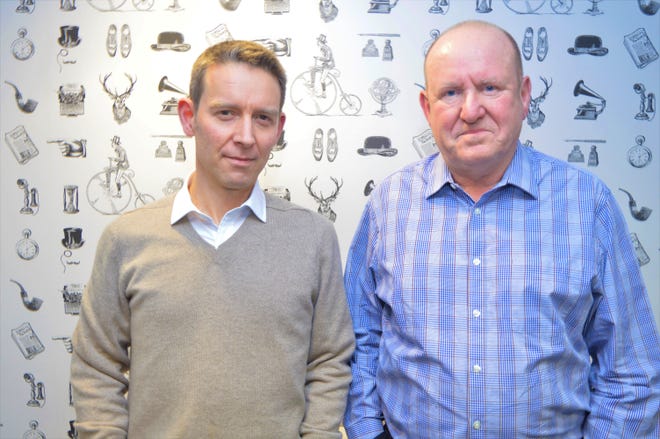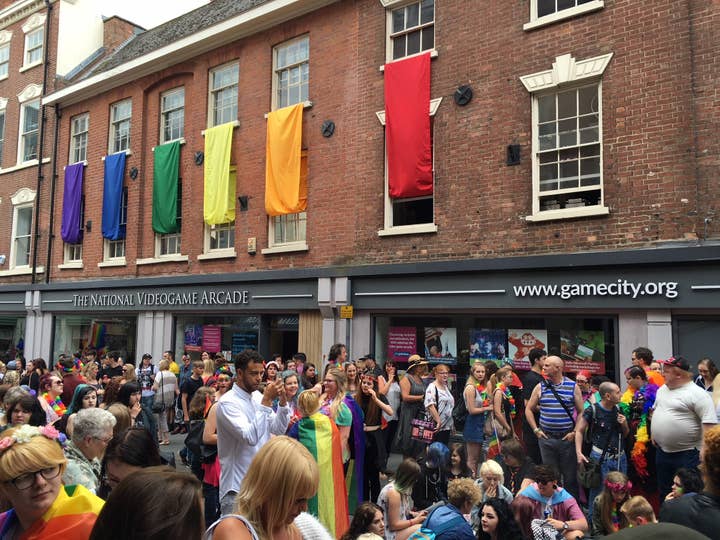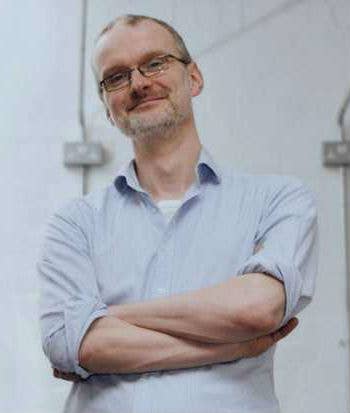British Games Institute “becomes real” with National Videogame Foundation merger
“We're not here to displace anything,” new organisation tells GamesIndustry.biz
The foundations for the British Games Institute have now been laid as the team behind the proposed new body announce a merger with the National Videogame Foundation.
Prior to this, the BGI has essentially been a campaign to encourage the UK government to invest in a new institution that would seek public funding for the games industry and its various initiatives. After the team failed to receive any allocation from the Autumn Budget, the search began for an alternative way to establish the Institute, culminating in this merger.
The British Games Institute's new headquarters will be based at the National Videogame Arcade in Nottingham, with members of the National Videogame Foundation joining the BGI team. Of note is NVF CEO Iain Simons, who takes on the role of Culture Director at the new body.
The combined organisation will continue to operate and develop the Arcade, as well as the various research and educational projects the Foundation was already running. Additionally, it will build on the programs the BGI team started during last year's campaign.
"Our proposition is that we're not here to displace what's already there. If we do that, we will have failed"
Rick Gibson, British Games Institute
For CEO Rick Gibson, the National Videogame Foundation was a natural fit for the BGI, sharing many of its goals and ambitions.
"As we join with the bricks-and-mortar of the Arcade and this fantastic team, the BGI becomes a very real thing, with existing programs and relationships with public funding bodies," he tells GamesIndustry.biz.
"The BGI is an industry-supported body with deep experience of games finance and games production, and a stake in the future of games culture. The NVF has been doing all this work in culture, reaching out to arts organisations and also to the public. Both of us need to come together.
"We need the skillset of these cultural practitioners who speak the language of the arts bodies, but they need the industry closer so that we can start tying in the natural synchronicity between games culture, games production and games training. That's where we are creating something new and strong that just doesn't exist today."

Gibson stresses the point that the British Games Institute is, in fact, a new organisation and not an alternative to those that already represent the UK industry. This was a point of confusion for some throughout the 2017 campaign, but one he is more than happy to clarify again.
"Our proposition is that we're not here to displace what's already there," he says. "If we do that, we will have failed. We are not, for instance, a trade body: we're not here to conduct lobbying, we are not going to be funded by companies' membership fees. I need to state that very clearly, we are not trying to steal the lunch of either of the trade bodies - and I think they acknowledge that because both have formally supported us.
"It's also important that we don't displace some of the smaller initiatives out there doing brilliant work. We want to strengthen their arm - if we can help them raise more money, then great. That's why we're talking to all of the existing organisations, to check we're not proposing something identical at the exact time they're trying to raise funding.
"Culture is where games meet people - but all people, not just middle-class white guys like us because we're pretty well catered for."
Iain Simons, British Games Institute
"We are being as sensitive as we can to the existing organisations, but we've got to remain true to the ambition: we believe, and hundreds of companies behind us believe, that there is a need for a new centre of gravity in games culture."
As Gibson says, both TIGA and UKIE formally supported the proposed BGI last year - along with over 500 other games, investment, arts and education organisations - and yet there have still been grumblings among some industry figureheads that such a body in unnecessary given the work the trade bodies already do, or could even expand into doing. Gibson is aware of these, and assures that the BGI will be working closely with UKIE and TIGA to avoid any clashes.
"We've formally invited the CEOs of both [trade bodies] to observe the BGI's board meetings," he says. "That's where we will share our plans going forward and receive their feedback. We want to be complementary and collaborative with those organisations. They have similar goals [so] what we need to do is establish routes to actually deliver on some of those goals, and we see the BGI as a vehicle to deliver on some of the policy goals of those organisations."
Last time we spoke to the BGI team, Ian Livingstone (the industry veteran that co-authored the original proposal with Gibson) compared games' situation to the film industry. Not only does the sector have six trade bodies, it also has a national agency in the British Film Institute (on which the BGI is largely modelled), plus multiple industry or European-funded regional screen agencies, multiple national arts bodies, and over 40 film festivals and other initiatives.
Reiterating this point, Gibson adds: "You also have the Arts Council, the BBC, Channel 4 - you have a wide range of public or semi-public funded bodies that get along and work together. What they have done over decades is very successfully raise the profile of film in order to release around £170m of public funding into their sector. At the moment, video games has just over £4m. That is not adequate."
"There is more public funding we can bring into the games industry. At a time when public funding for games has been falling like a stone for the past nearly two years, it's time for the organisations that are out there to come together, collaborate and build something new."

Herein lies the main priority for the newly-formed BGI: securing additional funding for games initiatives of all kinds. Once again, Gibson stresses that the Institute has no intention of taking funding away from "some of the excellent initiatives out there that are already funded", naming Games London and its Finance Market, plus the UK Games Fund and its Tranzfuser program, as just two examples.
"[Film bodies work together to] release around £170m of public funding into their sector. At the moment, video games has just over £4m. That is not adequate."
Rick Gibson, British Games Institute
In fact, recognising how much is already being done to secure funding for games companies has significantly changed the BGI's initial plans.
"We originally proposed a rather monolithic [culture] festival that would impose on different cities around the country," Gibson explains. "It meant well, but the more we spoke to people that ran similar festivals, we realised it threatened to come in and ride roughshod over existing events with fantastic track records and existing brands that had spent a long time building up their credibility and popularity.
"So we've changed that. Instead, with Iain's advice and that of others on the steering group, we decided the best thing to do was to raise money for a fund that can then invest in existing festivals and take them up a notch. We can help them expand, grow and reach more people."
While Gibson acknowledges the BGI means there will be another body bidding for funding in the mix, he doesn't necessarily see this as a bad thing. On the contrary, he posits that multiple organisations bidding to public funding bodies for games projects can only be a good thing, because not every bid succeeds.
"Take a grant where only 25 per cent of organisations that bid receive funding," he says. "Now, you could either have one that bids and then you have a one in four chance of succeeding, or you could have ten and then you stand a chance of seeing some good projects funded and more public funding gets into games. The same principle stands for our organisation.
"What we don't want to do is bid for identical things from identical sources of public funding. That would be stupid, because that's not going to make sense to the public funding source. That's why we need to share, and be transparent, which is what we've been doing since we announced our plans. We'll amend and adapt, move away from areas where we might threaten existing funding, and focus on areas where there is none yet."

Another priority, as indicated by the merger with the National Videogame Foundation, is to raise awareness of games culture and explore how to introduce the industry and its accomplishments to more people. While the concept of culture might seem broad, new director Iain Simons says it's a vital avenue to explore.
"To some extent, it can be anything that touches upon the areas where games meet people - from your nan knitting a Sonic jumper, to the British Library creating an archive of console start-up sounds, to a group of nine-year-olds making an experimental game," he says. "And it should be all of those things. From that starting point, which is very broad, our responsibility is coming up with focus points that change and adapt to what's happening in the world that the BGI can [build on].
"Culture is where games meet people - but all people, not just middle-class white guys like us because we're pretty well catered for. It's everyone else that I'm particularly interested in, and if games are going to survive, they need to be made and consumed by all people."
Merging with the NVF and its famed Arcade gives the BGI instant in-roads with the arts community in order to pursue this goal. The NVF already runs various programs funded by the Arts Council of England, the British Library, the British Academy, the British Council and other arts bodies in order to "drive forward the agenda of the wider games sector for arts organisations".
For Simons, these initiatives are about building 'games literacy' among those not overly familiar with the sector.
"This is about building bridges to create new business. There isn't a vaccuum between [games and art], it's totally reconcilable."
Iain Simons, British Games Institute
"There used to be several arts bodies that used to commission Flash games to promote their exhibitions, and there's nothing wrong with that but these people are now trying to use games as more than just a promotional device for other things," he says.
"This is about opening their eyes to the breadth of what video games can be, and opening the door for pragmatic case studies into how games might be made. Not just what they are and how they look, but how much they cost, how to create a cashflow for them, and crucially who you should go to commission a video game. This is about building bridges to create new work and new business for people who make video games.
"It isn't that games and art don't get along. It isn't that art thinks games are all difficult, they just don't see each other. They drink in different bars. There isn't this vacuum between them, it's totally reconcilable."
Gibson adds: "The arts organisations that are dispersing hundreds of millions of pounds into arts projects have a real relevance problem. If you're an opera house or museum, you know you'll get ABC1 middle-class people coming to your events and festivals, but can you reach everybody? There's a demographic problem of relevance to arts as they move forward into a digital age.
"If they're not using a medium that has nearly 95% penetration for under 25s - that's our sector - then they're missing a trick. Every arts organisation I meet all want to do something with games, but they just don't know how."
However, both stress that the British Games Institute's quest for public funding is about more than working with the arts community - this is just a natural starting point, given the accomplishments of the NVF. The true potential for the Institute, and indeed the industry, lies far beyond this.
"As a consultant, I have worked for pharmaceutical companies, broadcasters, IP owners, internet companies, as well as games and finance companies - there are a huge number of firms that see value in games," says Gibson. "We've got a hell of a lot to give to a very wide range of sectors, and each one could release substantial funds - whether public or private - into games."








